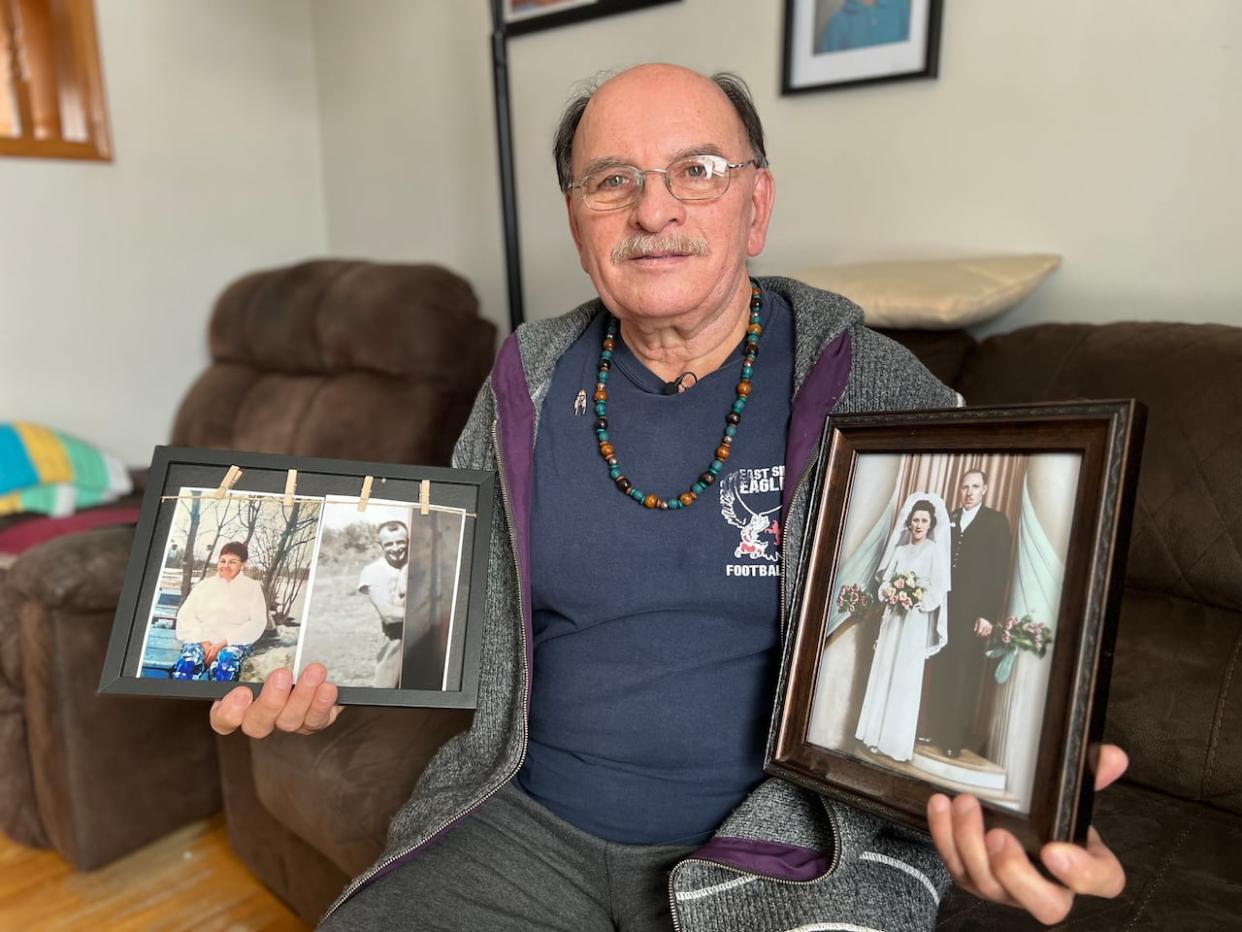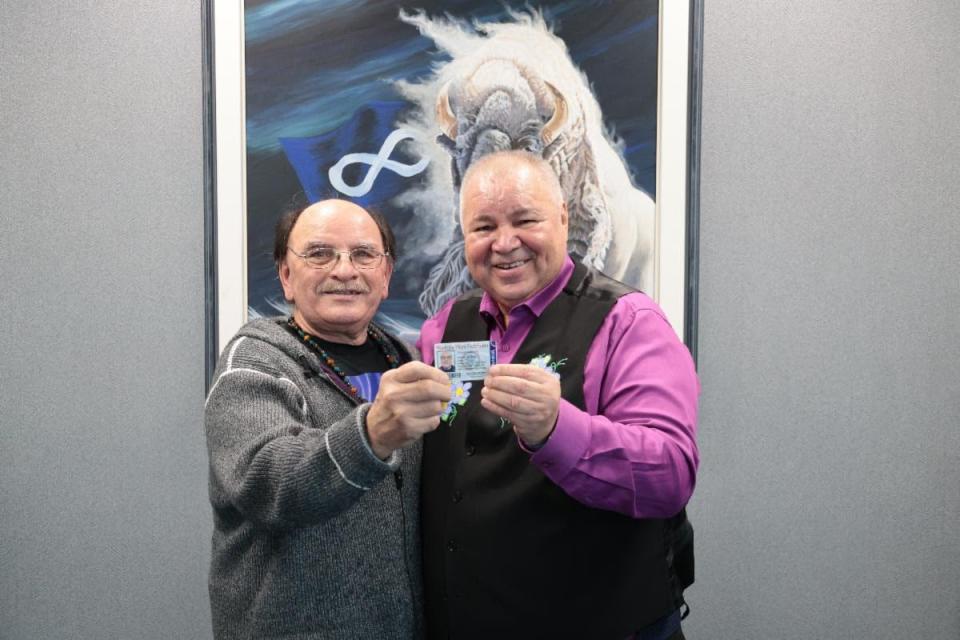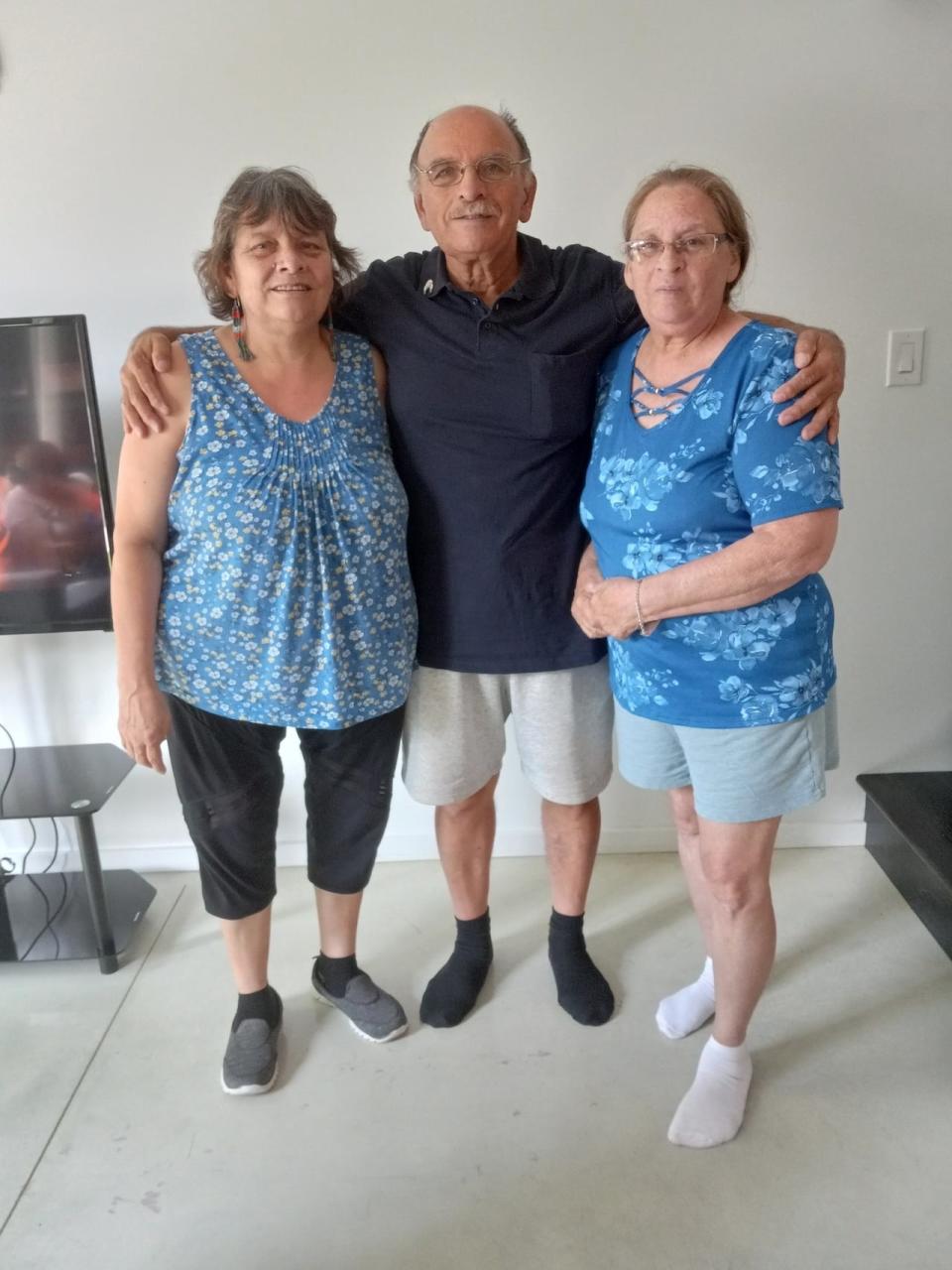For man switched at birth, path toward reclaiming lost Métis identity takes a step forward

A Winnipeg man who was switched at birth and grew up believing he was of Ukrainian heritage says he is one step closer to reclaiming his lost Métis identity.
Edward Ambrose obtained his Manitoba Métis Federation citizenship during a ceremony with MMF president David Chartrand last week.
"I couldn't hold it, I had to cry," Ambrose told CBC News. "Handing me the citizen card, I felt I was officially Métis."
Ambrose, 68, and Richard Beauvais learned in 2022 that they were sent home with the wrong families from a hospital in Arborg, Man., in 1955.
The revelation came as a result of Ambrose's sister taking a 23 and Me DNA test that suggested the pair weren't biological siblings — but she and Beauvais were.
Beauvais, who was raised in a Métis community near Lake Manitoba, is a residential day school survivor who was taken from his family during the Sixties Scoop. He was actually of Ukrainian, Jewish and Polish ancestry, and now lives in British Columbia.
Ambrose grew up on a farm in Rembrandt, Man., with a loving Ukrainian family, he said.
"The grief of what we went though, that will always be there — you'll never walk away from that — but for now I know who I am, and I know who my biological brothers and sisters are, so it's a step forward to a positive."
His biological sister Leona, together with Ambrose's daughter Eileen, were with him when he received his MMF citizenship card last week. Ambrose says Eileen is now in the process of applying for hers, too.
Chartrand said it was touching to be able to hand Ambrose his Métis citizenship card.
"He was so proud … to come home, proud to be who he is," said Chartrand.
"We're talking over six decades these two children were misplaced, so a lot of healing is going to have to take place, a lot of planning of holidays to fit two families in what they always thought they only had just one."

Edward Ambrose, left, and Manitoba Métis Federation president David Chartrand, right, pose for a photo as Ambrose obtains his MMF citizenship card on Feb. 13. (Manitoba Métis Federation)
Ambrose said it was overwhelming to learn that he and Leona had lived nearby in Winnipeg for years without knowing it.
Now, she sometimes comes by to have coffee with him and his wife after they drop off their respective grandchildren at school in the mornings, he said. He never got to meet his biological parents before they died.
Learning in other ways
Though he has the citizenship card and is building his relationship with his siblings, Ambrose said he is trying to learn more about his heritage and build connections in the Métis community in other ways.
He attended a ceremony on Monday at Louis Riel's gravesite at St. Boniface Cathedral for Louis Riel Day, the first such celebration since the Métis leader was recognized as the honorary first premier of Manitoba. Ambrose said it felt like a family reunion to be surrounded by others from his community.
Another way he is getting in touch with Indigenous culture is through beading. Ambrose said he's made necklaces for his sisters and nieces.

Ambrose is pictured with his sisters, Leona and Valerie, in 2023. (Submitted by Edward Ambrose)
"Little by little, trying to understand what it means to put it together, and how each thing means something," Ambrose said.
Bill Gange, a lawyer representing Ambrose and Beauvais, told CBC News last February that he had relayed a request from the men to the Manitoba government for compensation and an apology in April 2022. Gange said at the time that a lawyer representing the province said the Manitoba government had no legal liability in the case.
'One day at a time'
Ambrose and Beauvais aren't the only ones to have experienced something like this.
Two pairs of men from northern First Nation communities discovered they, too, were switched at birth at a hospital in Norway House Indian Hospital in 1975. Two of the men received financial settlements and other supports from the federal government.
For Ambrose, the path toward reconciling the identity he grew up with, with the one that he only recently discovered, continues to be a challenge.
"One day at a time," he said. "Challenging is the word for sure."
It would help if the Manitoba government issued an apology, he said.
"That would release an awful lot," he said. "So far it seems to be very hard to do…. I don't understand why."
Manitoba Health Minister Uzoma Asagwara says the province recognizes the "devastating" impacts that have been caused to Ambrose and Beauvais, adding the government looks forward to communicating with both of the men privately in the near future.
"While no one can truly understand what they must be feeling, and what they have gone through, we understand that recognition of this wrong is important," Asagwara said in a Tuesday statement to CBC News.

 Yahoo News
Yahoo News 
